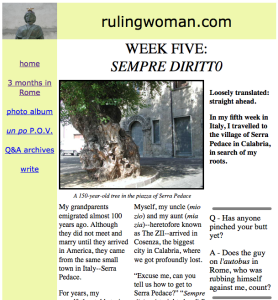
Loosely translated: straight ahead. In my fifth week in Italy, 2001, I traveled to the village of Serra Pedace in Calabria, in search of my roots.
My grandparents emigrated almost 100 years ago. Although they did not meet and marry until they arrived in America, they came from the same small town in Italy–Serra Pedace.
For years, my grandfather told stories about his village: the tree, the church, the men in the piazza. It was this reason that his son, my mother’s brother, my uncle, decided to make the trip to Italy.
So, I found myself close to the bottom of the boot, in a part of the country that is probably more like West Virginia than Rome. Simple, rustic, and somewhat impoverished. I had no map, no guide, and no understanding of the dialect. I could find no one who spoke English. In fact, I could barely find anyone who could understand me when I said “parla inglese?”
Myself, my uncle (mio zio) and my aunt (mia zia)–heretofore known as The ZII–arrived in Cosenza, the biggest city in Calabria, where we got profoundly lost.
“Excuse me, can you tell us how to get to Serra Pedace?” “Sempre diritto (straight ahead),” they would say, pointing left. We would go left, get lost, then stop.
“Excuse me,” I asked one man, “can you tell us how to get to Serra Pedace”? “Sempre diritto,” he would answer, pointing right.
At one point, the ZII even asked a nun. She talked for five minutes, in Italian of course, gesticulating madly both right AND left. Humbly offering, from time to time, those two magic words: “Sempre diritto!”
I think I know why my grandparents left Calabria.

Un Po P.O.V.
As a child, I would sit at my grandfather’s side and listen to his stories about Italy.
I finally got a chance to see where he came from, and learned more about him–and myself–in the process.
Of course, we all know that America is a country of immigrants, and understand how very difficult it must have been for entire families to pack up all their possessions and move to another country. You need only travel to a foreign land to understand how challenging it is merely to communicate.
When my grandfather arrived in the early part of the last century, he was put to work on the railroad. In America, he always said, you were given a “pick and a shovel.” It did not matter whether, in the old country, you were doctor, lawyer or even shoemaker, like he was, you did hard labor. Even your name was changed. From Vincenzo, after HIS grandfather, my grandpa became “Charlie.”
It was with this knowledge that we walked through the narrow streets of Serra Pedace. In this tiny hilltop village–almost frozen in time–we wondered how they even HEARD of America. Certainly, telephone communication was dicey, at best. Like many immigrants in those days, the father preceded the family to America to pave the way. My grandmother’s father left Serra Pedace while they stayed home and waited. And waited, and waited. After several months, they got worried, sending the oldest brother to America to find out what had happened. It was only then that they learned their father had died. The task of burying him, and taking care of the family then fell to the brother.

My grandfather was very proud of the fact that he served in the United States Army. He also always said that he did not want to come back to Italy. I think, now, I understand why.

Leave a Reply